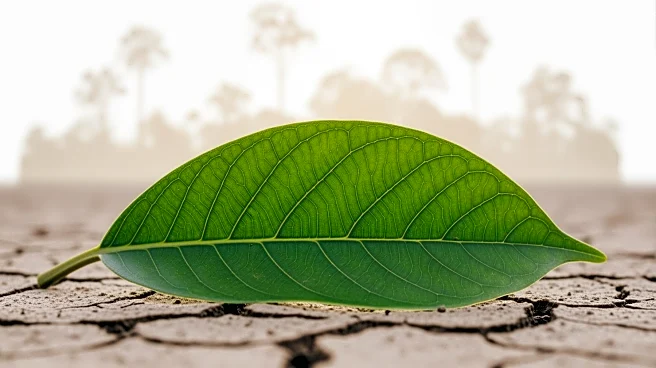What's Happening?
Recent research conducted by Lancaster University has highlighted significant changes in the composition of tree species in Brazilian forests due to human activities such as deforestation and forest degradation. The study, published in Nature Ecology
and Evolution, found that areas with substantial human disturbance are increasingly dominated by fast-growing, small-seeded tree species. These 'winning' species, characterized by rapid growth and shorter lifespans, are replacing the slow-growing, large-seeded trees that have denser wood. This shift poses a threat to biodiversity and reduces the forests' capacity to absorb and store carbon. The research team analyzed data from over 1,200 tropical tree species across more than 270 forest plots in the Brazilian Amazon and Atlantic forests. They observed that landscapes with high forest cover are dominated by dense-wooded, large-seeded trees, primarily dispersed by medium to large-bodied animals. In contrast, heavily deforested areas are increasingly populated by opportunistic species with softer wood and smaller seeds, dispersed by small, mobile birds and bats adapted to disturbed environments.
Why It's Important?
The findings of this study are significant as they underscore the impact of human activities on tropical forest ecosystems, which are vital for biodiversity and climate change mitigation. The shift towards fast-growing, small-seeded tree species reduces the forests' ability to store carbon, thereby affecting their role in absorbing greenhouse gases. Additionally, wildlife species that depend on large seeds for food and dispersal are adversely affected, leading to potential disruptions in the ecosystem. The study emphasizes the need for conservation and restoration efforts to preserve these ecosystems, highlighting the importance of indigenous-led initiatives to protect and restore the forests. Addressing not only deforestation but also forest disturbances such as selective logging and fires is crucial to maintaining the ecological balance and ensuring the sustainability of these vital ecosystems.
What's Next?
The research calls for urgent conservation and restoration efforts to address the ongoing shifts in tree species composition due to human disruption. Lead author Bruno X. Pinho and Senior Investigator Professor Jos Barlow stress the importance of supporting indigenous-led conservation initiatives to protect these ecosystems. The study suggests that addressing forest disturbances, including selective logging and fires, is essential to preserving the biodiversity and carbon storage capacity of tropical forests. These efforts are critical to mitigating climate change and maintaining the ecological balance in the region.
Beyond the Headlines
The study highlights the broader implications of deforestation and forest degradation, including ethical and cultural dimensions. Indigenous communities, who rely on these forests for their livelihoods and cultural practices, are directly affected by the changes in tree species composition. The research underscores the need for inclusive conservation strategies that involve indigenous peoples in decision-making processes. Additionally, the shift in tree species composition could lead to long-term changes in the ecosystem, affecting not only biodiversity but also the cultural heritage of the region.
















